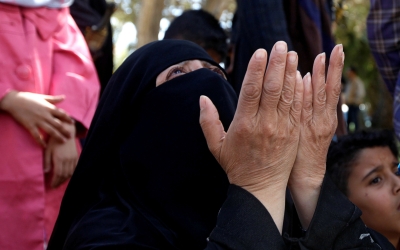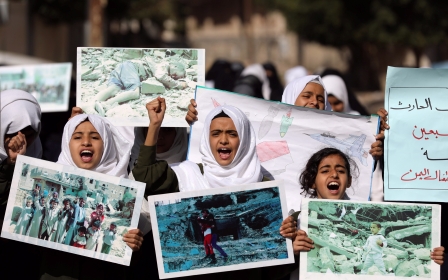'I can't run to save my life': Amnesty urges better care for Yemen's disabled

The war in Yemen has exacted an enormous toll on people with disabilities, forcing them to live on the margins of society and depriving them of badly needed humanitarian assistance, Amnesty International has said.
In a report released on Tuesday, the UK-based rights group said there was inadequate or non-existent support for disabled Yemenis - a population who were "most at risk and most marginalised" in the world's worst humanitarian crisis.
Rawya Rageh, a senior crisis advisor at Amnesty, said the war, which has been raging for almost five years and reportedly killed at least 100,000 people, was "preventing people with disabilities from meeting even their most basic needs".
"Yemen's war has been characterised by unlawful bombings, displacement and a dearth of basic services, leaving many struggling to survive," Rageh said.
'People with disabilities - who are already among those most at risk in armed conflict - should not face even greater challenges in accessing essential aid'
- Rawya Rageh, Amnesty
"The humanitarian response is overstretched, but people with disabilities - who are already among those most at risk in armed conflict - should not face even greater challenges in accessing essential aid.”
New MEE newsletter: Jerusalem Dispatch
Sign up to get the latest insights and analysis on Israel-Palestine, alongside Turkey Unpacked and other MEE newsletters
According to the World Health Organisation, around 15 percent of the population - an estimated 4.5 million Yemenis - suffer from disabilities.
The Amnesty report, citing nearly a hundred interviews, catalogued a daunting range of measures the country's disabled were forced to resort to in order to survive.
The mother of a three-year-old who has spinal muscular atrophy and epilepsy said that her own family had told her to "leave this girl by the rubbish", after they accused her of becoming a burden.
Abdullah Ali Qusseis, a 75-year-old man who described having limited mobility, recalled how petrified he was when he was forced from his home.
According to the UN, an estimated 3.65 million people have been displaced within Yemen as a result of the conflict since March 2015, the vast majority of them for more than one year.
Qusseis said planes would hover over his family's home "night and day". Shaken from this episode, he expressed his anxiety about his limited mobility: "I need medicine, so I can move. If anything happens, I can't run for my life - I need medicine for my knees."
The report added that camps for displaced Yemenis lacked wheelchairs, canes or devices like prosthetic limbs, confining disabled people to tents.
Access to toilets was also heavily limited, with handicapped people saying they had to crawl to toilets and make laborious treks to faraway food distribution centres.
'We don't know if he's dead or alive'
Jalila al-Saleh Ali said that when fighting broke out in her neighbourhood in Taiz, she abandoned her mentally ill husband at home as she ran away, carrying her 16-year-old handicapped son.
She said that her husband had struggled with a psychosocial disability for years. Not knowing how to stop him from hurting himself and others, the family resorted to chaining his hands and feet in a room at the back of their house.
"When the fighting happened, we left him next to the house tied up. We don't know if he's dead or alive."
As the war in the Arab world's poorest country grinds on, international donors must "do better to ensure these barriers that people with disabilities are facing are eliminated," urged Amnesty's Rageh.
"People with disabilities cannot continue to be left behind."
Saudi Arabia and a coalition of Arab states intervened in Yemen's war in March 2015 after Houthi rebels ousted the internationally recognised government of President Abd Rabbuh Mansour Hadi.
According to the Yemen Data Project, nearly 20,000 air raids have been carried out on Yemen since then, in an attempt to dislodge the rebels from power.
Last month, a senior Saudi official said that the kingdom had an "open channel" with the rebels as efforts to end the conflict gain momentum.
And on Thursday, about 128 Houthi rebels held in Saudi Arabia were released and flown to the Yemeni capital Sanaa.
Middle East Eye delivers independent and unrivalled coverage and analysis of the Middle East, North Africa and beyond. To learn more about republishing this content and the associated fees, please fill out this form. More about MEE can be found here.





